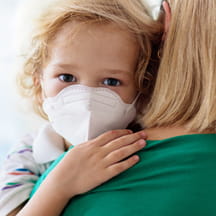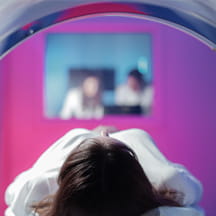While health care systems in many parts of the country struggle to keep up with spikes in new -19COVID infections, doctors are seeing a growing number of patients dealing with another aspect of the disease; post-COVID conditions, or long-haul COVID.
University Hospitals (UH) in Cleveland, Ohio, launched a multidisciplinary clinic to diagnose and treat long-haul COVID patients, including children and adolescents. Children's Hospitals Today caught up with Amy Edwards, M.D., associate medical director, Pediatric Infection Control, UH Rainbow Babies and Children's Hospital, to discuss long-haul COVID and how health care providers can best care for this emerging population.
What kind of challenges does long-haul COVID present for health care providers?
Interestingly enough, it's not new to us; COVID-19 is not the only infection that's known to do this to humans. We know Lyme disease and infectious mononucleosis can do this. We know about 25 percent of people who had the first SARS had some sort of problem like this; although, of course, the total number infected with the first SARS was tiny compared to what we're dealing with now. So, it is a problem doctors have been aware of for a long time.
I will say the major problem in the medical field is, for many decades, a long-haul illness was not considered to be a true illness. I was taught in medical school that it was a plea for attention or a psychiatric illness. It probably wasn't until the first SARS that more doctors finally started recognizing this as a real thing.
But even today, I think you will still find a large portion of providers who might be willing to acknowledge that something's happening with COVID-19 but don't believe or are not aware that there are other infections that can do this—that can really create a barrier between the patient and the medical provider.
What makes it difficult is, in a lot of these patients, their medical tests come back normal. So, as a doctor you say, ‘everything's normal' and ‘I'm sorry, there's nothing I can do to help you,' and these patients aren't getting the care they need because we don't really know what kind of care they do need. It can be hard to help someone get better when you're not really sure exactly what's wrong with them.
How difficult is it to diagnose and treat long-haul COVID?
That's a great question because we see a lot of depression and anxiety in long-haul COVID. But how much is that these patients are anxious they'll never feel better again, or they're depressed because they can't get out of bed—and how much is the depression feeding into the long-haul symptoms? There can be a lot of overlap there
So far, it hasn't been that hard to diagnose people because at this stage the people who are coming to our attention have very dramatic symptoms, which they can clearly pinpoint to the days following their COVID-19 infection.
Those are the easy ones—they're coming to me; I'm not having to find them. I think what's going to be more difficult in the long term, as these more obvious cases are treated, is trying to understand if there are other people out there who may have milder symptoms.
Perhaps they aren't seeing a need to come to the doctor now, but over time may deteriorate. I do anticipate that it is possible that some patients like that might fall through the cracks.
We have so little understanding of what we're dealing with now, as there aren't really clear diagnostic criteria. Currently, the only standard that most doctors are using is that the symptoms must last for 12 weeks or longer to be called long-haul, and they must be related to COVID-19.
I envision over the next year or two, criteria might evolve; but it may even be five or six years before we're able to settle on a set of diagnostic criteria. It's going to be a bit of an iterative process.
What can pediatricians do for their patients, especially for the less obvious cases?
The most important thing I have learned in the last several months in attempting to get a handle on long-haul COVID is how important listening is to these patients. They just feel terrible, and they often go from doctor to doctor. And so much of their medical tests come back normal, which makes them feel crazy—"How can doctor after doctor keep telling me I'm normal if I don't feel normal?”
Across the board, every patient I've met with has told me how much better they feel emotionally and psychologically by just having me listen to them and affirming that it's normal for them to feel this way, there are other patients suffering with these symptoms, they're not crazy and this is a real thing.
I may not have all the answers, but I've learned enough in the last couple of months to at least be able to empathize with them—and that seems to make a huge difference in their outlook and how they feel about what they're going through.
I have urged all my patients to join a support group. There are many online long-haul COVID support groups on various social media networks. There's a community out there that is going through the same thing they're going through. Any pediatrician can recommend that, even if they don't know how else to help their patient.
We have noticed a trend where if somebody has long-haul COVID and then gets vaccinated, about 50% of the time they report improvement in their symptoms. Among the rest, about 30% report no change in symptoms, and about 20% will even say it made theirs slightly worse.
But with about 50% of patients with long-haul COVID reporting improvements in their symptoms, it's something providers need to talk with their patients about. There's no guarantee—but especially for the very debilitated patients who can hardly get out of bed, it's something to think about.


